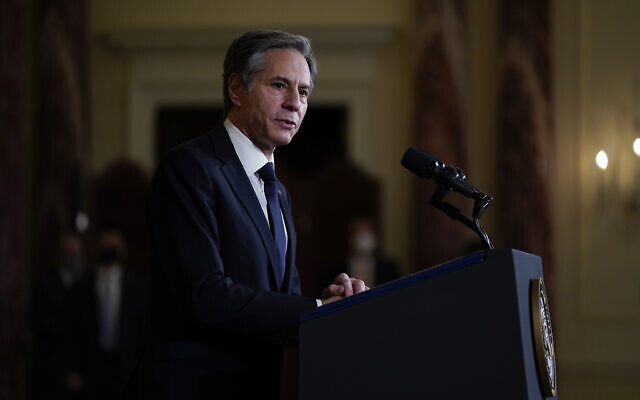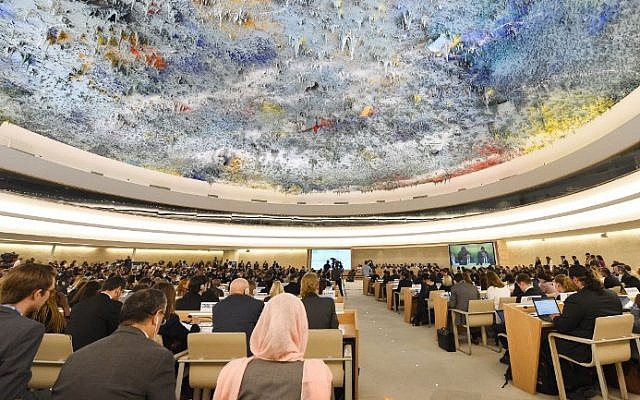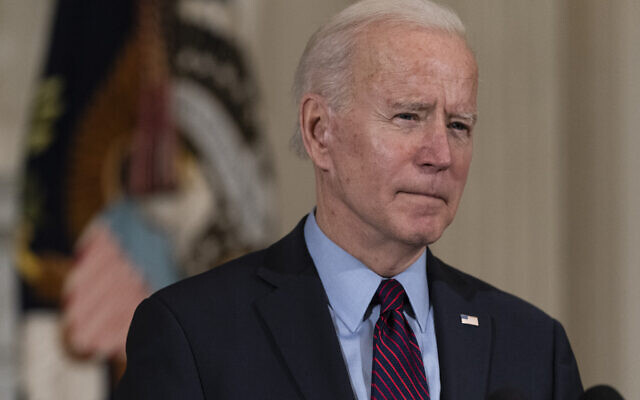Secretary of state says council ‘needs reform, but walking away won’t fix it’; Trump withdrew from organization over anti-Israel bias

US Secretary of State Antony Blinken announced Monday that the Biden administration had decided to return the US to the UN Human Rights Council, reversing the departure by former president Donald Trump, who cited ongoing Israel bias by the body in his decision to leave.
“The UN Human Rights Council is flawed and needs reform, but walking away won’t fix it. The best way to improve the Council, so it can achieve its potential, is through robust and principled US leadership,” Blinken tweeted.
“Under President Biden, we are reengaging and ready to lead,” he said.
Trump pulled out of the council in 2018 due to its disproportionate focus on Israel, which has received by far the largest number of critical council resolutions against any country, and because it failed to meet an extensive list of reforms demanded by then-US ambassador to the United Nations Nikki Haley.
The @UN Human Rights Council is flawed and needs reform, but walking away won’t fix it. The best way to improve the Council, so it can achieve its potential, is through robust and principled U.S. leadership. Under @POTUS Biden, we are reengaging and ready to lead.
— Secretary Antony Blinken (@SecBlinken) February 8, 2021
When it works well, the @UN Human Rights Council shines a spotlight on countries with the worst human rights records and can serve as a beacon for those fighting against injustice and tyranny. That’s why the U.S. is back at the table.
— Secretary Antony Blinken (@SecBlinken) February 8, 2021
The US charge d’affaires in Geneva, Mark Cassayre, told an organizational meeting of the UN’s main human rights body earlier Monday that the United States would return as an observer. US diplomats say that step comes with an eye toward seeking election as a full member.
“The Biden administration believes in a foreign policy centered on democracy, human rights and equality,” Cassayre told an organizational meeting of the council. “Effective use of multilateral tools is an important element of that vision.”
The decision is likely to draw criticism from conservative lawmakers and many in the pro-Israel community, who have derided the council and echoed Trump administration complaints that it was too quick to overlook abuses by autocratic regimes and governments — and even accept them as members.
In addition to the council’s persistent focus on Israel, the Trump administration took issue with the body’s membership, which currently includes China, Cuba, Eritrea, Russia and Venezuela, all of which have been accused of human rights abuses.

One senior US official said the Biden administration believed the council must still reform but that the best way to promote change is to “engage with it in a principled fashion.” The official said it can be “an important forum for those fighting tyranny and injustice around the world” and the US presence intends to “ensure it can live up to that potential.”
That official and three others familiar with the decision were not authorized to discuss the matter publicly ahead of the announcement and spoke on condition of anonymity.
Although the US will have only nonvoting observer status on the council through the end of 2021, the officials said the administration intends to seek one of three full member seats — currently held by Austria, Denmark and Italy — from the “Western Europe and other states group” that come up for election later this year.
The UN General Assembly makes the final choice in a vote that generally takes place in October every year to fill vacancies in three-year terms at the 47-member-state council.
US engagement with the council and its predecessor, the UN Human Rights Commission, has been something of a political football between Republican and Democratic administrations for decades. While recognizing its shortcomings, Democratic presidents have tended to want a seat at the table while Republicans have recoiled at its criticism of Israel.
Trump’s withdrawal from the UNHRC was one of a number of US retrenchments from the international community during his four years in office. He also walked away from the Paris Climate Accord, the Iran nuclear deal, the World Health Organization, the UN education and cultural organization UNESCO, and several arms-control treaties. Trump also threatened to withdraw from the International Postal Union and frequently hinted at pulling out of the World Trade Organization.

Since taking office last month, US President Joe Biden has rejoined both the Paris accord and the WHO and has signaled interest in returning to the Iran deal as well as UNESCO.
When Trump quit the UNHRC, Israel praised the move as a “courageous decision against the hypocrisy and the lies” of the international body.
“Instead of dealing with regimes that systematically violate human rights, the UNHRC obsessively focuses on Israel, the one genuine democracy in the Middle East,” the office of Prime Minister Benjamin Netanyahu said at the time.
A permanent element of the council’s agenda is Item 7 (“the human rights situation in Palestine and other occupied Arab territories”), which since its adoption in 2007 has singled out Israel for perpetual censure, a measure that no other country faces at the UN body.
As reported by The Times of Israel
